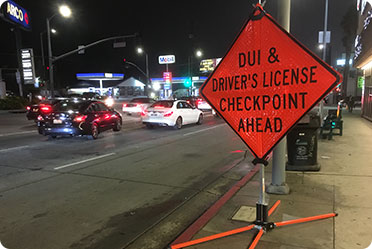
Labor Day weekend approaches and so does heightened DUI patrolling. One of the DUI detection methods used during the holiday is the roadblock or checkpoint. These DUI roadblocks are supposed to be minimally intrusive and brief in duration for any driver who is not breaking the law. Nevertheless, if you are under the influence of alcohol or drugs, then most likely the roadblock encounter will end up in your arrest. Here’s what to expect from a DUI checkpoint.
Before a driver arrives at a checkpoint, there should be advanced warning in the roadway that a roadblock or checkpoint is ahead. Then, the traffic is funneled into one lane on the highway. Police officers can stop every car, but many roadblocks are established to stop cars at specific intervals, e.g. every 3rd car. The checkpoint should not result in a major traffic delay for motorists. Otherwise, the police may decide to temporarily suspend the roadblock in order for the traffic back-up to dissipate.
Typically, the roadblock is in two stages. There is an initial detection stage and a secondary testing stage. At the initial stage, a police officer asks the driver if he or she has been drinking. For the officer to send a driver to the secondary stage for field sobriety testing, there needs to be reasonable suspicion that the driver is intoxicated. In other words, some of the tell-tale signs of intoxication have to be present before conducting a further investigation. Some of those signs are bloodshot eyes, the odor of an alcoholic beverage, slurred speech and slow verbal responses.
In the secondary stage, the police will have the driver perform field sobriety tests. Although the police are free to administer any type of test, the routine tests are the one-leg stand, walk-and-turn and HGN eye test. Sometimes, a portable breath test is used (PBT).
A driver is not required to perform field sobriety tests if requested to do so by the police, unlike having to submit to blood alcohol testing after an arrest (breath in New Jersey – blood, urine or breath in Pennsylvania). However, if you decide to perform field sobriety tests, make sure that the officer knows of any physical limitations or injuries you have before performing the tests.
Following the field sobriety testing, the officer will make a decision of whether to arrest for DWI. Usually, the driver is then taken by another officer back to the station for breath testing or to a hospital for drawing blood samples. Occasionally, a mobile substation is at the scene for immediate breath testing.
Although the police are allowed to establish roadblocks, they still have to follow certain constitutional guidelines. The police cannot just make a roadblock at anytime and anywhere on a whim. There must be sufficient justification for the roadblock in that vicinity, guidelines for the conduct of the roadblock, and prior notice to the public. Otherwise, any evidence gathered during the investigation may be inadmissible in court. This would inevitably lead to the dismissal of the DUI charge.
Be careful this weekend and make sure that you have alternative plans for transportation if you drink too much.
Leckerman Law focuses on safeguarding the
rights of individuals charged with DUI, DWI, DAI, and
other alcohol-related criminal offenses - Call Us Now For
NJ DWI (856) 429-2323 | For PA DUI (215) 496-9292